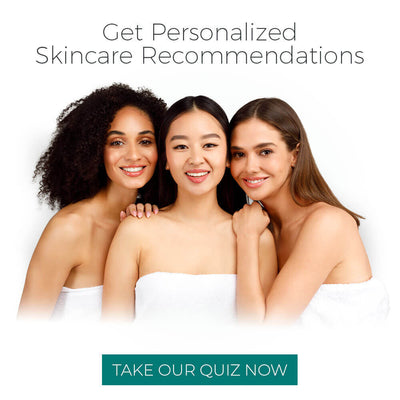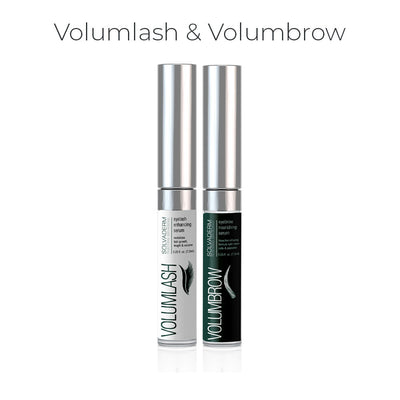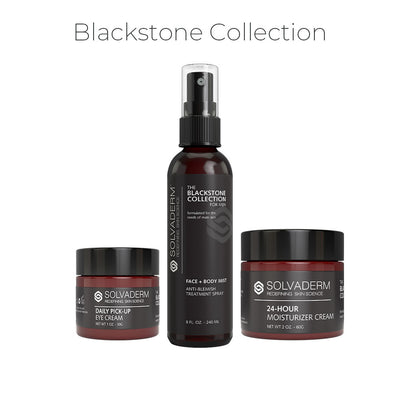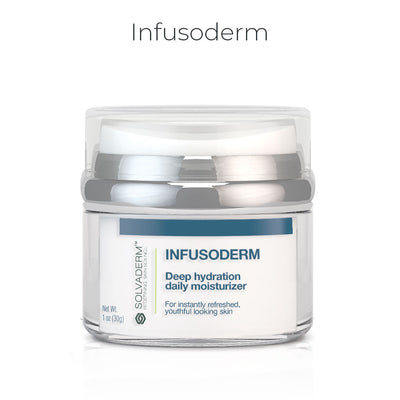Blind pimples, lurking beneath your skin's surface, can be frustrating and uncomfortable. These stubborn blemishes, also known as closed comedones, don't come to a head like regular pimples, making them particularly challenging to address.
In this guide, we'll delve into what blind pimples are, who is susceptible to them, and explore practical strategies to get rid of them. From understanding their stages to using targeted treatments like Zeroblem Advance Acne Treatment, Rejuvoderm Clarifying Cleanser, and Infusoderm Deep Hydration Moisturizer, we've got you covered.
Say goodbye to the discomfort and nuisance that blind pimples bring, and say hello to clear, radiant skin. Let's embark on the journey towards a blemish-free complexion.
What is a Blind Pimple?
A blind pimple, also known as a closed comedone, is a type of acne that develops beneath the skin's surface. Unlike regular pimples with a visible white or black head, blind pimples are characterized by a deep-seated, painful lump without a discernible head. You’ll likely find them on your face, upper back, or chest.
They occur when excess oil, dead skin cells, and bacteria clog a hair follicle, leading to inflammation and the formation of an under-the-skin pimple. Blind pimples often appear red, swollen, and tender to the touch. Due to their hidden location, they can be more challenging to treat and may take longer to get rid of than surface-level pimples.
Who Might Get Blind Pimples?
Blind pimples can affect people of all ages, but they’re more common in teenagers and young adults. This is primarily due to hormonal fluctuations during puberty and young adulthood, increasing sebum or oil production. As a result, those in this age group are more likely to develop blind pimples.
However, it's important to note that blind pimples are not exclusive to teenagers and young adults. They can also occur in adults. Additionally, people with naturally oily skin are more prone to developing blind pimples, as the excess oil can contribute to clogged pores and the formation of these deep-seated blemishes. Those with a family history of blind pimples are also more likely to have them.[1]
How Common Are Blind Pimples?
Blind pimples are a relatively common form of acne, which is the most common skin condition in the United States. It’s estimated that nearly 85%[2] of people will have some form of acne in their lifetime, with many seeing these changes around puberty.
They follow different patterns, either appearing sporadically or persisting over time. This depends on various factors, including genetics, hormonal fluctuations, and skincare habits. Understanding their causes and effective blind pimple treatment methods are crucial for managing and preventing these stubborn blemishes.
What are the Stages of a Blind Pimple?
Blind pimples progress through several distinct stages, each having different symptoms:
- Initial Inflammation: At the onset, the affected area may appear red, swollen, and tender to the touch. This indicates your body's natural response to the buildup of excess sebum, dead skin cells, and bacteria within a hair follicle.
- Formation of a Firm Lump: As the blind pimple develops, it forms a firm, often painful lump beneath your skin's surface. Unlike surface-level pimples, there is no visible head of pus. Instead, the blockage remains trapped deep within the skin.
- Pain and Discomfort: Blind pimples can be painful due to occurring close to nerve endings, leading to heightened sensitivity and discomfort.
- Potential for Subsiding Inflammation: Over time, the inflammation and pain may start to go away, but the blind pimple itself remains beneath your skin's surface.
- Hardened Nodule (if untreated): If not properly treated, a blind pimple can evolve into a small, hardened nodule beneath the skin. This can persist for an extended period, potentially leading to scarring if not managed appropriately.
How Do You Get a Blind Pimple Out?
Removing a blind pimple requires caution to prevent further irritation or potential scarring. You’ll want to start by reducing inflammation in the area by using a cold compress or ice pack. It’s also recommended to clean your skin with a mild, non-abrasive cleanser like Rejuvoderm Clarifying Cleanser. This helps to wash away excess sebum or oils on the skin that causes more blind pimples to appear.
Refrain from attempting to squeeze or pop the pimple, as this will increase redness and inflammation and may lead to scarring. It’s best to use an acne treatment like Zeroblem Advance Acne Treatment to help get rid of blind pimples.
What Causes Blind Pimples
Blind pimples arise from various underlying factors:
-
Clogged Pores: When excess sebum, dead skin cells, and bacteria accumulate within a hair follicle, it can lead to a blind pimple.
-
Hormonal Changes: Fluctuations in hormones particularly during puberty, menstruation, or pregnancy can increase sebum production, making individuals more susceptible to blind pimples.
-
Stress: Heightened stress levels can trigger hormonal imbalances[3], potentially exacerbating blind pimple development.
-
Certain Medications: Some medications[4] may influence hormonal levels, contributing to blind pimples in susceptible individuals.
-
Harsh Facial Cleansers: Overusing aggressive skincare products can disrupt the skin's natural balance, leading to pore blockages and blind pimples.
-
Sweat: Excessive sweating[5], especially when combined with friction from tight clothing, can create an environment conducive to blind pimple formation.
How to Get Rid of Blind Pimples?
Getting rid of an under-the-skin pimple should be done carefully. Here's a step-by-step guide on how to address a blind pimple:
- Ice the Pimple: Begin by applying a wrapped ice cube or a cold compress to the affected area for a few minutes. This helps reduce inflammation and soothe the skin.
- Gently Cleanse the Area: Use a mild, non-abrasive cleanser to clean the skin around the blind pimple gently. Using a product like Rejuvoderm Clarifying Cleanser is recommended for its gentle yet effective formula.
- Apply an Anti-Acne Product: Dab a targeted anti-acne treatment, such as Zeroblem Advance Acne Treatment, directly onto the blind pimple. This product is designed to help alleviate inflammation and promote healing.
- Hydrate and Protect: Apply a non-pore-clogging moisturizer like Infusoderm Deep Hydration Moisturizer to keep the area hydrated and prevent excessive dryness.
Continue with this regimen consistently, typically once or twice a day, until the blind pimple goes away. It's important to be patient, as it may take some time to heal fully.
Can You Prevent Blind Pimples?
Preventing blind pimples involves adopting a consistent skincare routine and healthy habits:-
Clean Skin Regularly: Regularly cleanse your skin to remove excess oil, dirt, and debris contributing to pore blockages.
-
Use Appropriate Skincare: Choose non-pore-clogging products. Opt for gentle cleansers such as Rejuvoderm Clarifying Cleanser and oil-free moisturizers like Infusoderm Deep Hydration Moisturizer.
-
Regularly Wash Items That Touch The Face: This includes pillowcases, towels, and makeup brushes to prevent the transfer of bacteria.
-
Avoid Scrubbing The Skin: Harsh scrubbing worsens irritation and potentially leads to more blind pimples. Opt for gentle, circular motions during cleansing.
-
Unclog Pores with a Retinoid: Incorporate a retinoid-based product into your skincare routine. This helps regulate sebum production and prevent pore blockages.
-
Wear Sunscreen: Choose a sunscreen to protect your skin from harmful UV rays without clogging pores.
-
Don't Over-Wash Your Face: Excessive washing strips your skin of natural oils, leading to increased sebum or oil production.
By taking these steps, you can prevent and get rid of blind pimples under your skin.
What Can I Expect If I Have Blind Pimples?
If you have blind pimples, you can expect them to be painful, often appearing as swollen, red bumps beneath your skin's surface. Unlike surface-level pimples, they don’t have a visible head of black or white pus. Without proper treatment, they may stay under the skin for a long time, potentially leading to scarring.
Frequently Asked Questions
Can You Pop a Blind Pimple?
It's advised not to pop blind pimples, as it can lead to further inflammation, infection, and potential scarring.
Why Are Blind Pimples So Painful?
Blind pimples are painful because they form deep within the skin, close to nerve endings, causing them to be more sensitive.
How Long Do Blind Pimples Last?
Without treatment, blind pimples can last for several weeks. With proper care, they typically improve within a week or two.
Should You Squeeze the Clear Liquid Out of a Pimple?
It's generally not recommended to squeeze any type of pimple, as it can lead to further inflammation and potential scarring.
Conclusion
Understanding and effectively managing blind pimples helps in achieving clear, radiant skin. Blind pimples under the skin can be addressed with the right approach. By adopting a balanced skincare routine, avoiding common triggers, and utilizing targeted treatments like Zeroblem Advance Acne Treatment and Rejuvoderm Clarifying Cleanser, you can take control of your skin's health. It also helps to use products like Infusoderm Deep Hydration Moisturizer to replenish skin moisture. Patience is key, and consistent skincare will yield the best results. Embrace these strategies to help eliminate blind pimples, welcoming a complexion that radiates good health.
References
1] ↑Blind Pimple: Symptoms, Causes & Treatment. Cleveland Clinic.
2] ↑Skin conditions by the numbers. www.aad.org.
3] ↑Zari S, Alrahmani D. The association between stress and acne among female medical students in Jeddah, Saudi Arabia. Clin Cosmet Investig Dermatol. 2017;10:503-506. Published 2017 Dec 5. doi:10.2147/CCID.S148499
4] ↑Kazandjieva J, Tsankov N. Drug-induced acne. Clin Dermatol. 2017;35(2):156-162. doi:10.1016/j.clindermatol.2016.10.007
5] ↑Woo YR, Kim HS. Truncal Acne: An Overview. J Clin Med. 2022;11(13):3660. Published 2022 Jun 24. doi:10.3390/jcm11133660










